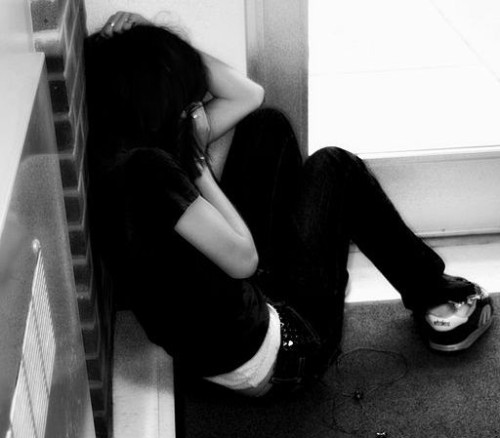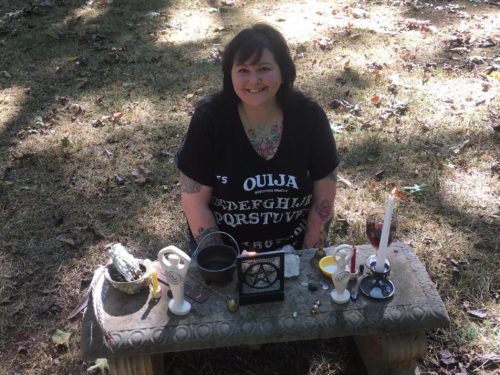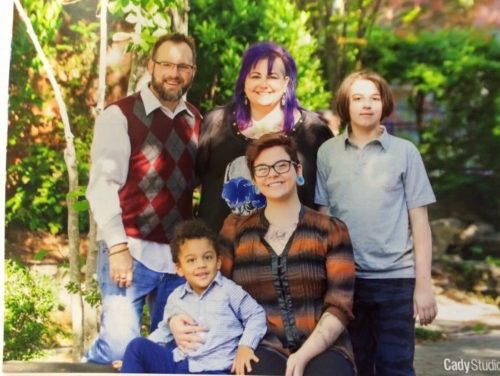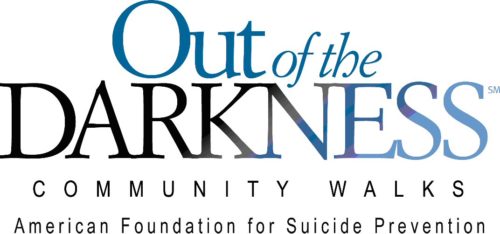[There are only 21 days left in the Fall Fund Drive. If you read The Wild Hunt and enjoy the service, consider donating today. This drive is what funds TWH for the entire year and keeps our team serving you professional news and commentary each day. This is your community; TWH is your community news source. Donate today and share our link! Thank you.]
“For anyone trying to carve out space in this world while creating the world we want to come…sometimes it is overwhelming. It feels like the floodwaters are rising, sweeping away supports, tugging the mind and body downward, until a person drowns.” – T. Thorn Coyle, from On Suicide in the New Belle Époque
ATLANTA, Ga. – Suicide. It lingers around in the shadows affecting people from all walks of life in all parts of the world. A 2016 report from Centers for Disease Control show that suicide is on the rise and considered the 10th leading cause of death in the U.S. In 2000, the U.S. rate was 10.4 and in 2014 the suicide rate was 13.1 per 100,000 individuals. Demographically speaking, the biggest shift was in the age group 45-65, which increased by nearly seven percentage points over the same time period.
According to the World Health Organization, the U.S. number is higher than the global rate, which is 11.4. Putting that into perspective, the republic of Korea has the highest rate at 36.8, and Saudi Arabia has the lowest at 0.3. The U.K. is recorded at 7.0; Australia 11.6; Canada 11.4; South Africa 2.7; and Brazil 6.0. No country or region is immune.
There are currently no statistics on suicide attempts. However, the American Foundation for Suicide Prevention reports that for every suicide there are 25 attempts. Additionally, there is much variation, even just in the U.S., in how assisted suicides affect the above statistics.

[public domain]
In the past several years, we’ve reported on a number of situations in which suicide affected Pagan communities. In 2001, Tempest Smith, a Pagan child from Michigan, died by suicide after experiencing years of bullying. Last year, Elain Morria spoke to us about her suicide attempt:
“I knew coming out as transgender was going to cause me pain thanks to the small fearful minds of people who have never walked in my shoes […] I took enough medication to kill me several times over. Posted my goodbye figuring nobody would even see it until at least a couple of hours after I was already dead and then went and laid down in my bed. I closed my eyes and curled up…”
Then, just last week, it was discovered that Seb Barnett, a beloved member of the Seattle Pagan and art communities, had died by suicide. Friends have since launched a funding campaign to honor Seb’s final wishes.
Now one Pagan woman in Georgia has decided that she doesn’t want to be a statistic, and is hoping that her own experiences with depression and suicide will help others.
“It is OK to talk about this,” explained Tara Denison, a 41-year old eclectic Witch from Atlanta, Georgia. “There is already so much judgment out there. Suicide knows no race, gender or age. It affects all of us.”
Denison is originally from Vancouver, Canada, and has fought depression as long as she can remember. “The first time I can remember feeling suicidal was pre teen. […] I went to multiple psychologists, therapists, doctors; nothing fully made me feel OK. Some times were better than others, and [the depression] just continued to grow as I did.”
Her first suicide attempt was as a teen. She consumed a “bottle of booze and a bottle of Tylenol,” after which she woke up very sick. “Being a teen was a hard time for me. I self-medicated with drugs and alcohol. I never felt like I fit in; I was always the weird kid and lashed out by fighting.”
Denison added, “As long as I stayed high or drunk the [suicidal] thoughts mostly stayed away until I was coming down off the drugs, then I would tell myself how stupid and worthless I was. Then, I got into a very unhealthy abusive relationship in my late teens which just fed my demons of my self-worth. ‘I was a piece of crap.’ Now not only was I saying it, I had someone else telling me too.”

Tara Denison [Courtesy Photo]
“You feel so alone and lost,” she explained. “I feel so out of control and really the best I can say is that it is almost a out of body experience. You can’t think logically. You are thinking about how you will affect others or how you are affecting others; you are in this bubble of personal hell that you can’t escape from.”
Over the years, Denison has reached out for professional help. She’s been on medication and through therapy, both of which helped “stop the suicidal thoughts.” However, these methods never prevented the “major bouts of depression.”
She said, “The pills would work for a while then stop working, so I felt like I was on so many pills in a short amount of time. I started to feel hopeless. I didn’t want to tell anyone, I didn’t want to live anymore because I was ashamed I felt like that. I didn’t feel like I could talk to my friends or family.”
At that point, Denison got pregnant with her daughter, which saved her for a while. But, as she said, the depression eventually “made its way back.” In fact, just last year, she wound up in the hospital, after yet another suicide attempt.
She had been crying for days and hadn’t showered in a week. She shared: “I had got the bottle of medication ready to take. […] I felt so out of control. I am a self-harmer in the sense that I scratch and pick my skin ’til it bleeds, I had scratched my neck so it was bleeding. […] I just wanted it to go away. I wanted to go to sleep to stop the hurt, the thoughts, the pain. I wanted to hit myself to stop the thoughts in my head telling me how worthless I am, why no one loves me, why I have no friends, why my family would be better off without me.”
Fortunately, a good friend saw what was coming and immediately called Denison’s husband, who came home and took her to hospital.
But even so, this was not the last time. Just two months ago, Denison overmedicated once again. She said, “I was in that moment, I was sick of crying; I was sick of feeling this. I was sick of my kids and husband seeing me like this. I just wanted to go to sleep. I do have a crisis plan in place but I chose to ignore it that night. I took about 6 prescription pills that help me sleep but I woke up.”
However, when she woke up this time something had changed in her. She decided it was time to speak out.
“When I came out of the hospital I decided to post about it because people asked where I had been since I am a pretty active poster online. I got a ton of messages from people saying they suffer as well but didn’t know what to do or where to go for help. I also had people saying they didn’t understand depression or couldn’t relate to how I was feeling, why couldn’t I just snap out of it. From then on I decided to be as vocal as possible.”
Denison added that she has now seen too many people suffering. As a result, she has will devote her time to making a difference. “I don’t want to die, I don’t want to live like this,” Denison explained.
“To think that there are so many people suffering like me out there makes me fight. So many people don’t know how to go about getting help. I want to be there to help them through it and help be their voice.”

Team Denison [Courtesy Photo]
Denison admits that, at first, this “coming out” of sorts was difficult. “I was very embarrassed about it […] ‘Oh yeah she is crazy; she tried to kill herself.’ I know people will think like that but that is why I think this needs to be talked about so much more. Mental health in itself needs to be talked about.”
When asked what the biggest misconception about suicide and depression was, she said, “That people do it for attention or that they are weak. No one who says they are going to kill themselves is doing it for fun. […] They are screaming for someone to grab their hand and help them.
“Suicide is a terrible thing. Anytime someone is successful it breaks my heart, not only for that person because I know the hopelessness they felt at that moment, but now the family and friends are left to pick up the pieces. ”
As for Denison’s own struggle, she has increasingly been relying on her spiritual practice for growth and support. She said that “going into circle and meditating is very comforting. I feel safe and protected.” She also said that she asks Athena for strength every morning.
“Sometimes I have a full on conversation with her and ask for signs to let me know that she is with me. ”
Denison also finds support with a close friend who, like herself, suffers from mental illness. “She understands and she is my go-to when I am in a whirlwind,” Denison explained. She also said that, in the end, her family has always saved her, but added, “I would like to say I save [myself].”
When asked how people can help the movement, Denison suggested donating money for education and research through organizations like AFSP. Other ways to help, she offered, would be through spreading the word about the many causes of and issues surrounding suicide,through supporting families who have lost someone to suicide, and by getting trained, where possible, in prevention and care.*
Her advice for those currently struggling with depression and suicidal thoughts: “You are not alone. If you are headed that way, please reach out to someone. Add me on Facebook if need be. Call the suicide hotline 1-800-273-8255. Talk to a friend, a family member. There are plenty of Facebook support groups, go and join.”
And, as for her advice to friends and family, she said, “If you have lost a loved one, do not blame yourself. If your loved one is living and struggling be pro active and get them help; go with them to the doctors; get them in therapy […] Find an out of the darkness walk in your area and walk, get people involved! Be the voice!”
Denison added that “If anyone in Atlanta would like to join me for the walk, it is Nov. 6 in the Piedmont Park picnic area. We are team Denison!”
* * *
[Editor’s Note: In 2015, we published an article titled “Treating Depression in a Pagan Context,” which discussed support methods and Pagan resources.]
The Wild Hunt is not responsible for links to external content.
To join a conversation on this post:
Visit our The Wild Hunt subreddit! Point your favorite browser to https://www.reddit.com/r/The_Wild_Hunt_News/, then click “JOIN”. Make sure to click the bell, too, to be notified of new articles posted to our subreddit.
Thank you for publishing this, Heather. An important topic that is too seldom discussed.
shared on my tumblr
Thank you Heather for publishing this. And a Big Thank You, Tara, for your bravery. It breaks my heart to hear that you are going through this terrible suffering. I wish I could just wave a magick wand and make it all better for you. I send an astral hug to you and your family. Blessings.
Thank you Gerrie ❤️
Suicide is the most talked about subset under the broader category of emotional crisis. It is the first concern when such a crisis comes to light, because while the vast majority of us have the support (both external and internal) to weather such storms, those who have only one or neither are at the highest risk of getting to that point of finality.
I write as an educated layperson, not a professional. I’ve been on both sides, supporting someone in crisis and being in crisis. There are truths to be discovered on both sides, but the one truth, the biggest aspect of the risk, is this: there is no such thing as a correct diagnosis and best treatment without sometimes very painful trial and error exploration.
So, I see crisis intervention as an integral and critical part of the identification and healing processes. We can, all of us, participate in this without needing to be trained or to have detailed knowledge of the person in question. We can emphasize empathy without ignoring sympathy. We can as gently as possible ask the sometimes prying questions that might lead us to have a concern for the safety of the person in crisis, and which might help us facilitate finding healing.
There’s no one thing that should be emphasized over other things, but for me personally there is one thing I would ask everyone to be active about. Question yourself when you fail to take serious notice when a person is in crisis, and I don’t mean for reasons of courtesy. Mental illness (as a broad category) continues to be stigmatized in our culture, and experiencing a mental illness too often includes buying into the stigma. “What’s wrong with you?” is a poor choice of phrasing, but it sounds just like the person’s inner dialogue, and implies blame. Instead try “What is ailing you?” or “You seem to be in pain.” It is no more “wrong” to have a mental illness than it is to have caught a cold virus.
To honor Tara’s courageous sharing, a personal note. When I was in crisis — and this was for a period of months, not hours or days — the downward spiral looked perfectly rational to me. No rational argument, especially the “man up” fallacy, would have any impact on my thinking. I was isolated in a closed loop. Nothing outside of it had any reality to me. I was caught, upheld, and helped onto a healing path before experiencing suicidal thoughts. I’m certain to this day that it was mostly serendipity and a timely, loving and absolutely necessary kick to my ass that kept me from them. The best thing a friend ever did for me was to acknowledge my pain, and deem it necessary to act to break through that pain without worrying that the action itself would be painful. Using fire breaks to stop a wild fire is a loose analogy for it.